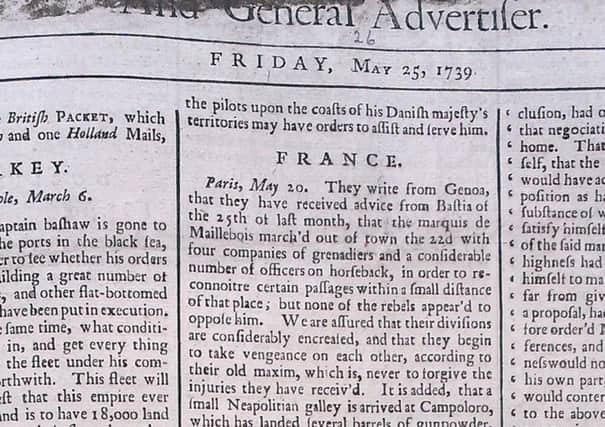Reported 280 Years Ago (June 5 1739): Violent man among two to die in Armagh jail


May 22.
We hear from Armagh, that two men died there lately in prison, upon each of them was held a coroner’s inquest; one of them was a millar, charged with murder by giving a woman big with child a kick on the belly, of which she languished some time and died; and beating and wounding his own father, frequently to the effusion of his blood; the third crime was assisting a vile fellow in setting fire to a poor man’s cabbin and abusing the people; the fourth crime was wilful perjury — he died in a very miserable condition.
[This incomplete report does not make clear what happened to the prisoners. It only seems to list the offences of one of the pair, before saying he died in a miserable condition. Does this imply that he was killed by other prisoners? The report, the entirety of which is copied above, does not explain]
DUBLIN, May 22.
Advertisement
Hide AdAdvertisement
Hide AdLast week a proclamation was published by their excellencies the lords justices, to prohibit any persons from harbouring, abetting, or giving assistance to John Leadwell, George Leadwell, Carden Bennett, Thomas Bennett, or Thomas Leadwell, concerned in the murder of lieutenant Hume.
And they are required to surrender themselves to any of his Majesty’s justices of peace before the first of August next.
[Lieut Hume was stabbed in a tavern in Roscrea, in what was then called King’s County, now Offaly. The town is in fact in neighbouring Tipperary. John Leadwell, who in February had been seen in Belfast, was later hanged for the offence . The £30 reward is £7,000 today]
Private letters from Bristol, assure, that a large ship was seiz’d in the province of Pensylvania, for having brought convict felons into that province, in order to expose them to sale as servants, the laws of that country being very strict to the contrary.
LONDON, May 15.
Advertisement
Hide AdAdvertisement
Hide AdOn Saturday Mr. Whitefield, attended by several of the genteelest of his followers, went on board a ship lying near Rotherhith, to take a view of her accommodations, and agree on terms, with the captain for his voyage to Georgia, for which colony, in company with some others lately gone methodically mad, he designs shortly to embark.
By letters from Calais we hear, that on Friday last in the morning a French man of war anchor’d off that town; soon after about 16 persons went on board (said to be pilots intended for the French squadron ordered to the Baltick) the man of war immediately after she had taken them on board, sail’d towards the port of Dunkirk.
The Mary Snow of Dublin, burden about 130 tons, Ignatius Biggs, master, was stranded a few days since near Padstow.
There are eleven men in town, who lately came out of Westmoreland, to give evidence in a cause that was depending to prove the custom of a manour; their ages, put together, makes 1010 years, and they all live within two or three miles of each other. [This is probably Westmoreland, Cumbria. If the total age above is correct, the men were 91 on average, but age was exaggerated in the 1700s]
Advertisement
Hide AdAdvertisement
Hide AdSixty thousand pounds sterling is to be lodg’d in the Exchequer for the British merchants, towards repairing the damages they have sustain’d by the depredations of the Spaniards. [£60k is £14 million in today’s money]
A cure for the Gout
Half an ounce of Hierpicra and eight grains of Cochinoel, both in fine powder, put both into a pint of the best red port.
Let it stand at least 24 hours, shake the bottle well and often during that time, but shake not the bottle for 3 or 4 hours before you draw off any of the tincture for use, take of this half a naggin, to new a naggin, according as you find yourself strong or weak, you must continue taking of this every second, third, or fourth day, till you take the whole pint, and if the gout returns take another pint as before, and so do to every fit.
This tincture if taken in a fit of the gout, in a few hours dissolves all the particles in the blood, which causes the pain, and will in time work them out of the blood.
Advertisement
Hide AdAdvertisement
Hide AdIt likewise carries off the new swellings soon, and all old swellings in time; you may use possit drink with this with other physick, yet if you take nothing after it, it will work very well; the properest time of taking it is in the morning fasting or at night if you do not eat or drink five hourse before; continue in bed from the time of taking it till it purges you downwards by stool, in about 12 hours time; but if you have not a stool in that time take a large spoonful more, if you have rheumatism, or sciatica, take the tincture as before, but in a larger quantity.
I caution all people that take this, to have special care that they do not take cold, for it will cause many to sweat greatly for a time, and if they take cold, for it will cause many to sweat greatly for a time, and if they take cold will be apt to be griped, which if they are, a little muld port wine, or a spoonful of the tincture immediately eases them.
N.B. The Hierpica must be made according to John Quincy’s dispensatory, Printed in London, in the year 1726.
[Major medical advances were still mostly more than a century away, into the future, in the 1800s. Many of these supposed ‘cures’ in the 1700s were little more than gobbledy gook]